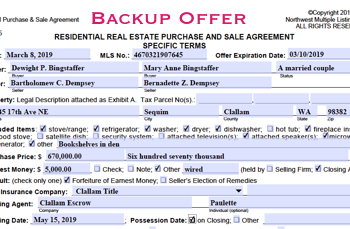Buying a home at a Sequim estate sale is not at all like buying a home from a homeowner, which is not at all like buying a home in a short sale, which is not at all like buying a home at a foreclosure sale (Trustee’s Sale), which is not at all like buying a home that is bank owned. Every single one of these transactions has it’s own unique issues, procedures, and different due diligence checklists for a buyer. This is why I write so passionately about “Traps for the Unwary,” because if a buyer doesn’t have the experience or is not represented by a Buyer’s Agent who does have experience in each of these areas, the consequences could be disastrous. Today I want to share some thoughts about buying a home at a Sequim estate sale.
Sequim Estate Sale Home
Sequim Estate Sale is Unique
In a normal real estate transaction where there is one homeowner (or couple) and one buyer (or couple), we will have their agents, an escrow company, a lender, an appraiser, an underwriter, and a home inspector. That’s quite a few parties to a real estate transaction, but watch what happens when we have an estate sale where the homeowners have passed away and now the home is put up for sale. In addition to all the regular parties, in a Sequim estate sale we may also have a trustee, a personal representative, an estate attorney, an accountant, a judge, a company that handles estate sales of personal possessions on the property, an insurance agent, a contractor, and a locksmith. What does all this mean and why is it significant to a buyer of a home in a Sequim estate sale?
Sequim Estate Sale and The Significance
When you have a real estate transaction that already has half a dozen people involved, all of whom are basically watching out for their own interests, then you add several more parties who all have different responsibilities, none of which align perfectly with a buyer’s interests, you have just elevated the complexity of working through issues, even minor issues, by an order of magnitude. Perhaps a very brief example will make the point best.
I just sold the home in the photos above, and it is an estate sale home. Because there is an estate attorney involved, a trustee and a personal representative, who is also a CPA, little issues that would otherwise be quickly resolved between a single seller and a single buyer become excessively complicated. For example, when the estate beneficiary is an elderly person, the trustee and the personal representative appointed by a judge, and the estate attorney all have the highest fiduciary duties in the law to their client. That means each of them feels obligated to play “extreme hardball” when negotiating even minor issues for their client. A small repair item on a $400,000 home, for example, can become a delay that can stretch out for weeks and even threaten the entire transaction, just because the professionals involved feel an extreme duty to protect their client(s).
In reality, their clients and any normal seller would quickly agree to reasonable requests by a buyer. But such reasonableness in a Sequim estate sale can get totally lost in the communications among all the parties to a transaction. I should point out that attorneys do not typically see themselves as facilitators of real estate transactions, nor do CPAs. I was a real estate attorney for 20 years, and there’s no question at all, and Realtors all know this, that the vast majority of attorneys are deal killers, not deal facilitators. I was a facilitator myself, but that’s probably because I was a Realtor before I became an attorney. All of this can be very frustrating for a qualified buyer who is ready, willing, and able to write a check at closing, but all the professionals on the seller’s side tend to make everything far more difficult than it normally would be. In this real estate market, a normal transaction is difficult enough to get to the closing table, but adding multiple professionals with their own agendas makes it much more challenging to get to closing.
Once you get pushed past the scheduled closing date, there are a hundred reasons it may not close. The loan underwriter may come up with an objection, the buyers may transfer money from one account to another or sell something that the underwriter says disqualifies them, another sale may cause the appraisal to need to be amended, there could be a small fire in the house, a buyer’s health may fail or God forbid, a buyer may die, and the transaction will not close. I could go on and on about why transactions fail, so delaying a closing date for an insignificant reason is like playing with fire.
As always, if you are looking at buying a home in this kind of scenario, I strongly urge you to find an experienced professional buyer’s agent. Knowing how to navigate the labyrinthian challenges of a Sequim estate sale can turn out to be very important for you as a buyer.
Last Updated on June 23, 2012 by Chuck Marunde


































Thanks for this article. We’ve been looking at Sequim real estate and thinking about retiring in Sequim. We read your articles regularly and learn so much.
Your Sequim real estate site is the best one on the Net without any competition. Thank you for the phenomenal hard work you have put into writing all these articles. We love them.